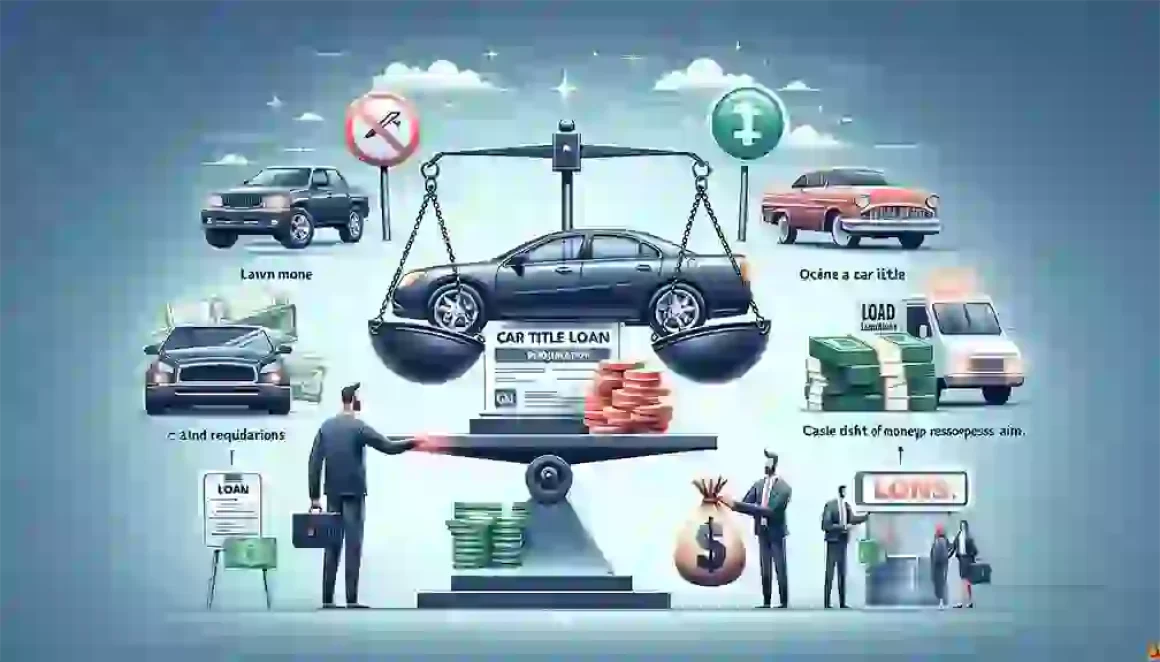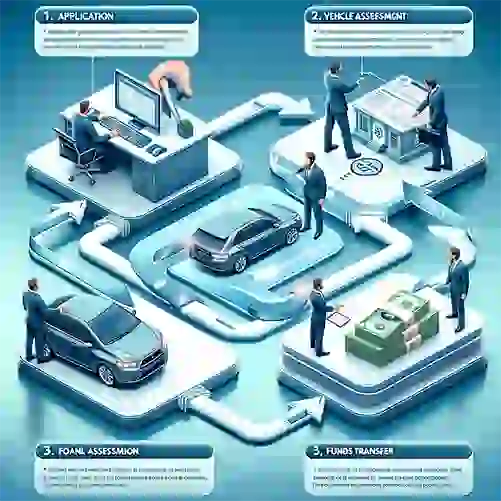How Do Car Title Loans Work?
Introduction
When I find myself in a financial pinch, the options can seem limited. However, for car owners like me, a car title loan presents a viable solution. Essentially, a car title loan is a short term loan where the borrower’s vehicle title is used as collateral. You retain the use of your car, but the lender holds onto the title as security for the repayment of the loan. It’s a form of secured loan where the amount of money lent is typically based on the value of the car.
Understanding the car title loan process is crucial for any car owner considering this financial avenue. It’s not just about getting quick cash; it’s about comprehending the responsibilities and risks involved. The process involves assessing the value of your vehicle, completing paperwork, and agreeing to the loan terms, which usually include high interest rates and a short repayment period. The ease of access to funds can be tempting, but it’s accompanied by the risk of losing one’s vehicle if the loan isn’t repaid according to the agreed terms.
The importance of grasping the intricacies of car title loans cannot be overstated. With recent data indicating that around 2 million Americans opt for car title loans annually, and with interest rates that can soar to over 300% APR, the stakes are high. It’s a market that’s both bustling and complex, and as a car owner, I must navigate it with both eyes open. By delving into the specifics of how these loans work, I can make informed decisions that align with my financial health and long term well being.

How Do Car Title Loans Work?
The process of obtaining a car title loan might seem daunting at first, but it’s actually quite straightforward when broken down into steps. As someone who values clarity, I’ll walk you through the procedure from start to finish. Initially, you’ll need to find a reputable lender. This is a critical step, as the terms and interest rates can vary significantly. Once you’ve selected a lender, the first official step is to submit an application, which typically includes providing personal information and details about your vehicle.
The lender will then assess the value of your car to determine how much money they can lend you. This is where your car plays a pivotal role as collateral. The loan amount is usually a percentage of the car’s market value, ensuring that the lender can recover their funds if you’re unable to repay the loan. After the evaluation, you’ll be presented with a loan agreement that outlines the terms, including the loan amount, interest rate, fees, and repayment schedule. It’s essential to read this agreement carefully and understand every aspect before you proceed.
If you agree to the terms, you’ll sign the contract and hand over the car title to the lender. In exchange, you receive the loan amount, either in cash or as a direct deposit to your bank account. It’s important to note that while you surrender the title, you can continue to use your car as usual. However, the lender has the legal right to take possession of your vehicle if you default on the loan. This underscores the importance of planning your finances to ensure timely repayment.
Repayment typically begins within a month of receiving the loan and can extend for several months or even years, depending on the agreement. Some lenders may offer a single payment loan, where the entire amount plus interest is due at once, while others may allow for installment payments over time. The flexibility of the repayment options can be a double edged sword; while it may seem convenient, it can also lead to a cycle of debt if not managed properly.
To illustrate the process more vividly, let’s look at some statistics. According to the Consumer Financial Protection Bureau, one in five car title loan borrowers ends up having their vehicle seized for failing to repay their loans. This stark reality highlights the critical role of your car as collateral and the importance of fully understanding the loan terms. With this knowledge, you can make an informed decision and avoid becoming a statistic.
Get started now
Requirements for Car Title Loans
To be eligible for a car title loan, there are several requirements that I, as a borrower, must meet. These prerequisites are not just formalities; they are in place to ensure that the transaction is secure for both the lender and myself. The most fundamental requirement is that I must own the vehicle outright; the car must be paid off in full and cannot be currently financed through another lender. Additionally, the title must be in my name, and it should be clear of any liens, meaning no other company can claim ownership of the vehicle.
Another critical requirement is proof of income. Lenders need to verify that I have a reliable source of income to repay the loan. This doesn’t necessarily mean traditional employment; income can come from various sources such as self employment, retirement, or disability benefits. However, the key is to prove that I have the means to meet the repayment terms. Furthermore, I must provide a government issued ID to confirm my identity and residency. This helps the lender ensure that I am who I claim to be and that I reside within the state where the loan is being issued.
Insurance is another important factor. Some lenders require that the car is insured, as this protects their investment in the event of an accident or theft. Lastly, I may need to present several personal references who can vouch for my reliability and character. These references can be crucial in the lender’s decision making process.
Meeting these requirements is not just about ticking boxes; it’s about establishing trust with the lender. According to industry reports, lenders who enforce strict requirements tend to have lower default rates, which translates to more favorable terms for borrowers like me. By understanding and preparing to meet these requirements, I can streamline the loan process and improve my chances of approval.
| Requirement | Description | Why It’s Important |
|---|---|---|
| Clear Title | The car must be fully paid off and in your name. | Ensures no other claims on the vehicle. |
| Proof of Income | Documentation showing a steady income. | Confirms ability to repay the loan. |
| Government Issued ID | A valid ID to verify identity and residency. | Prevents fraud and confirms eligibility. |
| Insurance | Full coverage or liability insurance on the vehicle. | Protects the lender’s assets. |
| Personal References | Individuals who can attest to your reliability. | Additional assurance for the lender. |

Benefits of Car Title Loans
Car title loans can be a beacon of hope for individuals like me who need immediate financial relief. One of the most significant advantages is the quick access to cash. In many cases, the loan can be approved and disbursed within a day or two. This rapid turnaround can be a lifesaver in emergency situations where time is of the essence, such as unexpected medical bills or urgent home repairs. The ability to secure funds swiftly, without the lengthy application processes associated with traditional bank loans, is a substantial benefit for those in a bind.
Another key benefit is the absence of a credit check. Traditional lending institutions typically require a thorough credit evaluation, which can be a stumbling block for individuals with less than stellar credit histories. Car title loans, however, are secured against the vehicle’s value, which means that my credit score is not a determining factor in the eligibility process. This opens up borrowing opportunities for a wider range of individuals, including those who might otherwise be excluded from financial assistance due to their credit background.
Moreover, the convenience of being able to keep using my car while repaying the loan cannot be overstated. Unlike pawn arrangements, where the pawned item is held until the loan is repaid, car title loans allow me to maintain my mobility and independence. This is particularly important for individuals who rely on their vehicle for commuting to work, transporting family members, or conducting daily errands. The lender holds the title, but I retain the keys, ensuring that my day to day life is not disrupted.
To put these benefits into perspective, let’s consider some statistics. A study by the Consumer Financial Protection Bureau found that car title loans are used by approximately 1% of American households in a given year. This statistic underscores the appeal of these loans as a financial resource for a significant number of people. The combination of speed, leniency on credit, and the ability to continue using the car gives car title loans a unique position in the landscape of personal finance options.
Submit your information today!

Risks of Car Title Loans
While car title loans offer quick cash, they come with their share of risks that I must carefully consider. One of the most significant risks is the high interest rates and fees associated with these loans. It’s not uncommon for car title loans to have annual percentage rates (APRs) as high as 300%. These exorbitant rates can quickly turn a manageable loan into an overwhelming debt. For example, on a
How Do Car Title Loans Work?
Introduction
When I find myself in a financial pinch, the options can seem limited. However, for car owners like me, a car title loan presents a viable solution. Essentially, a car title loan is a short term loan where the borrower’s vehicle title is used as collateral. You retain the use of your car, but the lender holds onto the title as security for the repayment of the loan. It’s a form of secured loan where the amount of money lent is typically based on the value of the car.
Understanding the car title loan process is crucial for any car owner considering this financial avenue. It’s not just about getting quick cash; it’s about comprehending the responsibilities and risks involved. The process involves assessing the value of your vehicle, completing paperwork, and agreeing to the loan terms, which usually include high interest rates and a short repayment period. The ease of access to funds can be tempting, but it’s accompanied by the risk of losing one’s vehicle if the loan isn’t repaid according to the agreed terms.
The importance of grasping the intricacies of car title loans cannot be overstated. With recent data indicating that around 2 million Americans opt for car title loans annually, and with interest rates that can soar to over 300% APR, the stakes are high. It’s a market that’s both bustling and complex, and as a car owner, I must navigate it with both eyes open. By delving into the specifics of how these loans work, I can make informed decisions that align with my financial health and long term well being.

How Do Car Title Loans Work?
The process of obtaining a car title loan might seem daunting at first, but it’s actually quite straightforward when broken down into steps. As someone who values clarity, I’ll walk you through the procedure from start to finish. Initially, you’ll need to find a reputable lender. This is a critical step, as the terms and interest rates can vary significantly. Once you’ve selected a lender, the first official step is to submit an application, which typically includes providing personal information and details about your vehicle.
The lender will then assess the value of your car to determine how much money they can lend you. This is where your car plays a pivotal role as collateral. The loan amount is usually a percentage of the car’s market value, ensuring that the lender can recover their funds if you’re unable to repay the loan. After the evaluation, you’ll be presented with a loan agreement that outlines the terms, including the loan amount, interest rate, fees, and repayment schedule. It’s essential to read this agreement carefully and understand every aspect before you proceed.
If you agree to the terms, you’ll sign the contract and hand over the car title to the lender. In exchange, you receive the loan amount, either in cash or as a direct deposit to your bank account. It’s important to note that while you surrender the title, you can continue to use your car as usual. However, the lender has the legal right to take possession of your vehicle if you default on the loan. This underscores the importance of planning your finances to ensure timely repayment.
Repayment typically begins within a month of receiving the loan and can extend for several months or even years, depending on the agreement. Some lenders may offer a single payment loan, where the entire amount plus interest is due at once, while others may allow for installment payments over time. The flexibility of the repayment options can be a double edged sword; while it may seem convenient, it can also lead to a cycle of debt if not managed properly.
To illustrate the process more vividly, let’s look at some statistics. According to the Consumer Financial Protection Bureau, one in five car title loan borrowers ends up having their vehicle seized for failing to repay their loans. This stark reality highlights the critical role of your car as collateral and the importance of fully understanding the loan terms. With this knowledge, you can make an informed decision and avoid becoming a statistic.
Get started now
Requirements for Car Title Loans
To be eligible for a car title loan, there are several requirements that I, as a borrower, must meet. These prerequisites are not just formalities; they are in place to ensure that the transaction is secure for both the lender and myself. The most fundamental requirement is that I must own the vehicle outright; the car must be paid off in full and cannot be currently financed through another lender. Additionally, the title must be in my name, and it should be clear of any liens, meaning no other company can claim ownership of the vehicle.
Another critical requirement is proof of income. Lenders need to verify that I have a reliable source of income to repay the loan. This doesn’t necessarily mean traditional employment; income can come from various sources such as self employment, retirement, or disability benefits. However, the key is to prove that I have the means to meet the repayment terms. Furthermore, I must provide a government issued ID to confirm my identity and residency. This helps the lender ensure that I am who I claim to be and that I reside within the state where the loan is being issued.
Insurance is another important factor. Some lenders require that the car is insured, as this protects their investment in the event of an accident or theft. Lastly, I may need to present several personal references who can vouch for my reliability and character. These references can be crucial in the lender’s decision making process.
Meeting these requirements is not just about ticking boxes; it’s about establishing trust with the lender. According to industry reports, lenders who enforce strict requirements tend to have lower default rates, which translates to more favorable terms for borrowers like me. By understanding and preparing to meet these requirements, I can streamline the loan process and improve my chances of approval.
| Requirement | Description | Why It’s Important |
|---|---|---|
| Clear Title | The car must be fully paid off and in your name. | Ensures no other claims on the vehicle. |
| Proof of Income | Documentation showing a steady income. | Confirms ability to repay the loan. |
| Government Issued ID | A valid ID to verify identity and residency. | Prevents fraud and confirms eligibility. |
| Insurance | Full coverage or liability insurance on the vehicle. | Protects the lender’s assets. |
| Personal References | Individuals who can attest to your reliability. | Additional assurance for the lender. |

Benefits of Car Title Loans
Car title loans can be a beacon of hope for individuals like me who need immediate financial relief. One of the most significant advantages is the quick access to cash. In many cases, the loan can be approved and disbursed within a day or two. This rapid turnaround can be a lifesaver in emergency situations where time is of the essence, such as unexpected medical bills or urgent home repairs. The ability to secure funds swiftly, without the lengthy application processes associated with traditional bank loans, is a substantial benefit for those in a bind.
Another key benefit is the absence of a credit check. Traditional lending institutions typically require a thorough credit evaluation, which can be a stumbling block for individuals with less than stellar credit histories. Car title loans, however, are secured against the vehicle’s value, which means that my credit score is not a determining factor in the eligibility process. This opens up borrowing opportunities for a wider range of individuals, including those who might otherwise be excluded from financial assistance due to their credit background.
Moreover, the convenience of being able to keep using my car while repaying the loan cannot be overstated. Unlike pawn arrangements, where the pawned item is held until the loan is repaid, car title loans allow me to maintain my mobility and independence. This is particularly important for individuals who rely on their vehicle for commuting to work, transporting family members, or conducting daily errands. The lender holds the title, but I retain the keys, ensuring that my day to day life is not disrupted.
To put these benefits into perspective, let’s consider some statistics. A study by the Consumer Financial Protection Bureau found that car title loans are used by approximately 1% of American households in a given year. This statistic underscores the appeal of these loans as a financial resource for a significant number of people. The combination of speed, leniency on credit, and the ability to continue using the car gives car title loans a unique position in the landscape of personal finance options.
Submit your information today!

Risks of Car Title Loans
While car title loans offer quick cash, they come with their share of risks that I must carefully consider. One of the most significant risks is the high interest rates and fees associated with these loans. It’s not uncommon for car title loans to have annual percentage rates (APRs) as high as 300%. These exorbitant rates can quickly turn a manageable loan into an overwhelming debt. For example, on a $1,000 loan with a 25% monthly fee, I could end up paying $1,250 in just one month, not including any additional administrative fees or penalties for late payments.
The potential for repossession is another serious risk. If I fail to repay the loan according to the agreed terms, the lender has the right to take possession of my vehicle. This could leave me without transportation, affecting my ability to work and manage daily responsibilities. Statistics from the Consumer Financial Protection Bureau reveal that one in five car title loan borrowers ends up having their vehicle repossessed. This stark reality highlights the importance of having a solid repayment plan in place before taking out a car title loan.
Additionally, car title loans often come with short repayment periods, typically 30 days. This can be a double edged sword; while it may seem convenient to have a quick loan, the short timeframe can create a cycle of debt if I’m unable to repay the initial loan and am forced to roll it over into a new loan with additional interest and fees. This cycle can be difficult to break and can lead to long term financial hardship.
It’s crucial for me to weigh these risks against the immediate need for cash. Understanding the full scope of the loan terms, the total cost of borrowing, and the potential consequences of default is essential. By doing so, I can make an informed decision and take steps to mitigate these risks, such as exploring alternative financing options or negotiating more favorable loan terms.
| Risk Factor | Impact | Statistic |
|---|---|---|
| High Interest Rates and Fees | Can lead to unmanageable debt and financial strain. | APRs can reach as high as 300%. |
| Potential for Repossession | Loss of vehicle and subsequent challenges in daily life. | 20% of borrowers experience repossession. |
| Short Repayment Periods | May result in a cycle of debt due to rollover loans. | Short term loans typically have a 30 day repayment period. |

Alternatives to Car Title Loans
As someone who values financial prudence, I recognize that car title loans should not be the first port of call when I’m in need of cash. There are several alternatives that can be less risky and more financially sound. Personal loans, for instance, are a viable option. They often come with lower interest rates compared to car title loans, especially if I have a good credit score. The repayment terms for personal loans are also typically longer, which can make the monthly payments more manageable.
Credit card cash advances are another alternative. While they do have higher interest rates than regular credit card purchases, they’re usually much lower than those of car title loans. Plus, the application process is straightforward if I already have a credit card, and I can access funds up to my available credit limit immediately. However, it’s important to be mindful of the cash advance fees and the interest that starts accruing immediately.
Borrowing from friends or family can also be a sensible choice. This option may not involve any interest or fees, and the repayment terms can be flexible. However, it’s crucial to treat any loan from loved ones as seriously as I would a loan from a financial institution to avoid damaging relationships. A clear and formal agreement about the loan terms can help prevent misunderstandings.
When considering these alternatives, it’s essential to compare the terms and total costs associated with each option. For example, the Federal Reserve reports that the average interest rate for a 24 month personal loan is around 9.5%, significantly lower than the triple digit APRs that can come with car title loans. By comparing these alternatives, I can make an informed decision that aligns with my financial situation and goals.
| Loan Type | Interest Rates | Repayment Terms | Other Considerations |
|---|---|---|---|
| Personal Loans | Varies, average around 9.5% | Longer terms, fixed monthly payments | Dependent on credit score |
| Credit Card Cash Advances | Higher than regular purchases | Flexible, minimum monthly payments | Immediate interest accrual, cash advance fees |
| Borrowing from Friends/Family | Typically none | Flexible, potentially longer terms | Can strain relationships if not managed properly |
Your lender will approve your loan
Conclusion
In summary, the car title loan process offers a quick and accessible means for car owners like me to secure funds in times of need. By using my vehicle as collateral, I can bypass the stringent credit checks required by traditional lenders and obtain cash swiftly to cover urgent expenses. However, this convenience comes with considerable risks, including exorbitant interest rates, the potential for repossession, and the pressure of short repayment periods. These factors can culminate in a precarious financial situation if not approached with caution.
The benefits of car title loans, such as retaining the use of my car and the absence of credit checks, are clear and can be compelling in the right circumstances. Yet, the associated risks demand a high degree of responsibility and foresight. It’s imperative that I fully understand the terms of the loan, assess my ability to repay it, and consider the long term implications on my financial health. Alternatives to car title loans, including personal loans, credit card cash advances, and borrowing from friends or family, should be weighed carefully to ensure that I make the most prudent choice for my situation.
Making informed decisions is the cornerstone of financial stability. As I navigate the complexities of car title loans, I am reminded of the importance of due diligence and the value of exploring all available options. By doing so, I can safeguard my financial future and avoid the pitfalls that can arise from hasty or uninformed choices. The balance between the immediate need for cash and the potential long term consequences is delicate, and it is one that requires careful consideration and a strategic approach.

How Do Car Title Loans Work?
Introduction
When I find myself in a financial pinch, the options can seem limited. However, for car owners like me, a car title loan presents a viable solution. Essentially, a car title loan is a short term loan where the borrower’s vehicle title is used as collateral. You retain the use of your car, but the lender holds onto the title as security for the repayment of the loan. It’s a form of secured loan where the amount of money lent is typically based on the value of the car.
Understanding the car title loan process is crucial for any car owner considering this financial avenue. It’s not just about getting quick cash; it’s about comprehending the responsibilities and risks involved. The process involves assessing the value of your vehicle, completing paperwork, and agreeing to the loan terms, which usually include high interest rates and a short repayment period. The ease of access to funds can be tempting, but it’s accompanied by the risk of losing one’s vehicle if the loan isn’t repaid according to the agreed terms.
The importance of grasping the intricacies of car title loans cannot be overstated. With recent data indicating that around 2 million Americans opt for car title loans annually, and with interest rates that can soar to over 300% APR, the stakes are high. It’s a market that’s both bustling and complex, and as a car owner, I must navigate it with both eyes open. By delving into the specifics of how these loans work, I can make informed decisions that align with my financial health and long term well being.

How Do Car Title Loans Work?
The process of obtaining a car title loan might seem daunting at first, but it’s actually quite straightforward when broken down into steps. As someone who values clarity, I’ll walk you through the procedure from start to finish. Initially, you’ll need to find a reputable lender. This is a critical step, as the terms and interest rates can vary significantly. Once you’ve selected a lender, the first official step is to submit an application, which typically includes providing personal information and details about your vehicle.
The lender will then assess the value of your car to determine how much money they can lend you. This is where your car plays a pivotal role as collateral. The loan amount is usually a percentage of the car’s market value, ensuring that the lender can recover their funds if you’re unable to repay the loan. After the evaluation, you’ll be presented with a loan agreement that outlines the terms, including the loan amount, interest rate, fees, and repayment schedule. It’s essential to read this agreement carefully and understand every aspect before you proceed.
If you agree to the terms, you’ll sign the contract and hand over the car title to the lender. In exchange, you receive the loan amount, either in cash or as a direct deposit to your bank account. It’s important to note that while you surrender the title, you can continue to use your car as usual. However, the lender has the legal right to take possession of your vehicle if you default on the loan. This underscores the importance of planning your finances to ensure timely repayment.
Repayment typically begins within a month of receiving the loan and can extend for several months or even years, depending on the agreement. Some lenders may offer a single payment loan, where the entire amount plus interest is due at once, while others may allow for installment payments over time. The flexibility of the repayment options can be a double edged sword; while it may seem convenient, it can also lead to a cycle of debt if not managed properly.
To illustrate the process more vividly, let’s look at some statistics. According to the Consumer Financial Protection Bureau, one in five car title loan borrowers ends up having their vehicle seized for failing to repay their loans. This stark reality highlights the critical role of your car as collateral and the importance of fully understanding the loan terms. With this knowledge, you can make an informed decision and avoid becoming a statistic.
Get started now
Requirements for Car Title Loans
To be eligible for a car title loan, there are several requirements that I, as a borrower, must meet. These prerequisites are not just formalities; they are in place to ensure that the transaction is secure for both the lender and myself. The most fundamental requirement is that I must own the vehicle outright; the car must be paid off in full and cannot be currently financed through another lender. Additionally, the title must be in my name, and it should be clear of any liens, meaning no other company can claim ownership of the vehicle.
Another critical requirement is proof of income. Lenders need to verify that I have a reliable source of income to repay the loan. This doesn’t necessarily mean traditional employment; income can come from various sources such as self employment, retirement, or disability benefits. However, the key is to prove that I have the means to meet the repayment terms. Furthermore, I must provide a government issued ID to confirm my identity and residency. This helps the lender ensure that I am who I claim to be and that I reside within the state where the loan is being issued.
Insurance is another important factor. Some lenders require that the car is insured, as this protects their investment in the event of an accident or theft. Lastly, I may need to present several personal references who can vouch for my reliability and character. These references can be crucial in the lender’s decision making process.
Meeting these requirements is not just about ticking boxes; it’s about establishing trust with the lender. According to industry reports, lenders who enforce strict requirements tend to have lower default rates, which translates to more favorable terms for borrowers like me. By understanding and preparing to meet these requirements, I can streamline the loan process and improve my chances of approval.
| Requirement | Description | Why It’s Important |
|---|---|---|
| Clear Title | The car must be fully paid off and in your name. | Ensures no other claims on the vehicle. |
| Proof of Income | Documentation showing a steady income. | Confirms ability to repay the loan. |
| Government Issued ID | A valid ID to verify identity and residency. | Prevents fraud and confirms eligibility. |
| Insurance | Full coverage or liability insurance on the vehicle. | Protects the lender’s assets. |
| Personal References | Individuals who can attest to your reliability. | Additional assurance for the lender. |

Benefits of Car Title Loans
Car title loans can be a beacon of hope for individuals like me who need immediate financial relief. One of the most significant advantages is the quick access to cash. In many cases, the loan can be approved and disbursed within a day or two. This rapid turnaround can be a lifesaver in emergency situations where time is of the essence, such as unexpected medical bills or urgent home repairs. The ability to secure funds swiftly, without the lengthy application processes associated with traditional bank loans, is a substantial benefit for those in a bind.
Another key benefit is the absence of a credit check. Traditional lending institutions typically require a thorough credit evaluation, which can be a stumbling block for individuals with less than stellar credit histories. Car title loans, however, are secured against the vehicle’s value, which means that my credit score is not a determining factor in the eligibility process. This opens up borrowing opportunities for a wider range of individuals, including those who might otherwise be excluded from financial assistance due to their credit background.
Moreover, the convenience of being able to keep using my car while repaying the loan cannot be overstated. Unlike pawn arrangements, where the pawned item is held until the loan is repaid, car title loans allow me to maintain my mobility and independence. This is particularly important for individuals who rely on their vehicle for commuting to work, transporting family members, or conducting daily errands. The lender holds the title, but I retain the keys, ensuring that my day to day life is not disrupted.
To put these benefits into perspective, let’s consider some statistics. A study by the Consumer Financial Protection Bureau found that car title loans are used by approximately 1% of American households in a given year. This statistic underscores the appeal of these loans as a financial resource for a significant number of people. The combination of speed, leniency on credit, and the ability to continue using the car gives car title loans a unique position in the landscape of personal finance options.
Submit your information today!

Risks of Car Title Loans
While car title loans offer quick cash, they come with their share of risks that I must carefully consider. One of the most significant risks is the high interest rates and fees associated with these loans. It’s not uncommon for car title loans to have annual percentage rates (APRs) as high as 300%. These exorbitant rates can quickly turn a manageable loan into an overwhelming debt. For example, on a $1,000 loan with a 25% monthly fee, I could end up paying $1,250 in just one month, not including any additional administrative fees or penalties for late payments.
The potential for repossession is another serious risk. If I fail to repay the loan according to the agreed terms, the lender has the right to take possession of my vehicle. This could leave me without transportation, affecting my ability to work and manage daily responsibilities. Statistics from the Consumer Financial Protection Bureau reveal that one in five car title loan borrowers ends up having their vehicle repossessed. This stark reality highlights the importance of having a solid repayment plan in place before taking out a car title loan.
Additionally, car title loans often come with short repayment periods, typically 30 days. This can be a double edged sword; while it may seem convenient to have a quick loan, the short timeframe can create a cycle of debt if I’m unable to repay the initial loan and am forced to roll it over into a new loan with additional interest and fees. This cycle can be difficult to break and can lead to long term financial hardship.
It’s crucial for me to weigh these risks against the immediate need for cash. Understanding the full scope of the loan terms, the total cost of borrowing, and the potential consequences of default is essential. By doing so, I can make an informed decision and take steps to mitigate these risks, such as exploring alternative financing options or negotiating more favorable loan terms.
| Risk Factor | Impact | Statistic |
|---|---|---|
| High Interest Rates and Fees | Can lead to unmanageable debt and financial strain. | APRs can reach as high as 300%. |
| Potential for Repossession | Loss of vehicle and subsequent challenges in daily life. | 20% of borrowers experience repossession. |
| Short Repayment Periods | May result in a cycle of debt due to rollover loans. | Short term loans typically have a 30 day repayment period. |

Alternatives to Car Title Loans
As someone who values financial prudence, I recognize that car title loans should not be the first port of call when I’m in need of cash. There are several alternatives that can be less risky and more financially sound. Personal loans, for instance, are a viable option. They often come with lower interest rates compared to car title loans, especially if I have a good credit score. The repayment terms for personal loans are also typically longer, which can make the monthly payments more manageable.
Credit card cash advances are another alternative. While they do have higher interest rates than regular credit card purchases, they’re usually much lower than those of car title loans. Plus, the application process is straightforward if I already have a credit card, and I can access funds up to my available credit limit immediately. However, it’s important to be mindful of the cash advance fees and the interest that starts accruing immediately.
Borrowing from friends or family can also be a sensible choice. This option may not involve any interest or fees, and the repayment terms can be flexible. However, it’s crucial to treat any loan from loved ones as seriously as I would a loan from a financial institution to avoid damaging relationships. A clear and formal agreement about the loan terms can help prevent misunderstandings.
When considering these alternatives, it’s essential to compare the terms and total costs associated with each option. For example, the Federal Reserve reports that the average interest rate for a 24 month personal loan is around 9.5%, significantly lower than the triple digit APRs that can come with car title loans. By comparing these alternatives, I can make an informed decision that aligns with my financial situation and goals.
| Loan Type | Interest Rates | Repayment Terms | Other Considerations |
|---|---|---|---|
| Personal Loans | Varies, average around 9.5% | Longer terms, fixed monthly payments | Dependent on credit score |
| Credit Card Cash Advances | Higher than regular purchases | Flexible, minimum monthly payments | Immediate interest accrual, cash advance fees |
| Borrowing from Friends/Family | Typically none | Flexible, potentially longer terms | Can strain relationships if not managed properly |
Your lender will approve your loan
Conclusion
In summary, the car title loan process offers a quick and accessible means for car owners like me to secure funds in times of need. By using my vehicle as collateral, I can bypass the stringent credit checks required by traditional lenders and obtain cash swiftly to cover urgent expenses. However, this convenience comes with considerable risks, including exorbitant interest rates, the potential for repossession, and the pressure of short repayment periods. These factors can culminate in a precarious financial situation if not approached with caution.
The benefits of car title loans, such as retaining the use of my car and the absence of credit checks, are clear and can be compelling in the right circumstances. Yet, the associated risks demand a high degree of responsibility and foresight. It’s imperative that I fully understand the terms of the loan, assess my ability to repay it, and consider the long term implications on my financial health. Alternatives to car title loans, including personal loans, credit card cash advances, and borrowing from friends or family, should be weighed carefully to ensure that I make the most prudent choice for my situation.
Making informed decisions is the cornerstone of financial stability. As I navigate the complexities of car title loans, I am reminded of the importance of due diligence and the value of exploring all available options. By doing so, I can safeguard my financial future and avoid the pitfalls that can arise from hasty or uninformed choices. The balance between the immediate need for cash and the potential long term consequences is delicate, and it is one that requires careful consideration and a strategic approach.

Jer is a Consultant & go-to guy for startups and founders. Expert with both Online and storefront B2C lending strategies. Jer at Trihouse Consulting is your Co-Founder, consultant, investor... Start-ups in installment, payday loan, car title lending, line of credit... Storefront to Online transition is my specialty. Focused on operations, marketing, Internet models, tribe, brick-n-mortar development, website development, regulatory & compliance, and State and Tribe licensed lending models. Banking, ODFI, ACH, ICL, Debit, Credit.
TrihouseConsulting@gmail.com 702-208-6736 (PDT)
Linked In profile
Mentioned in Digital Groth
Clarity FM
Trihouse Consulting
How to start a payday loan
zoom info
Startups.com
IWV Pro
Leaning Rock Finance
payday and paycheck loans
Automobile Pawn
Quora
Medium
RocketReach





